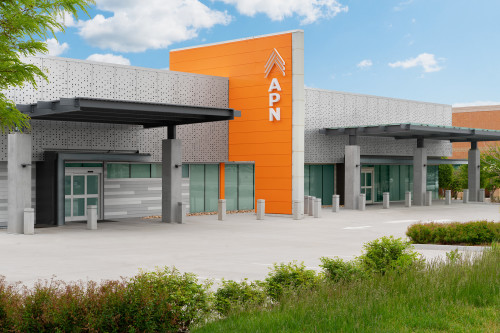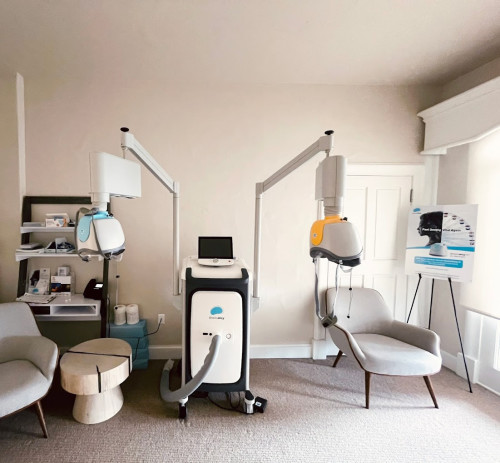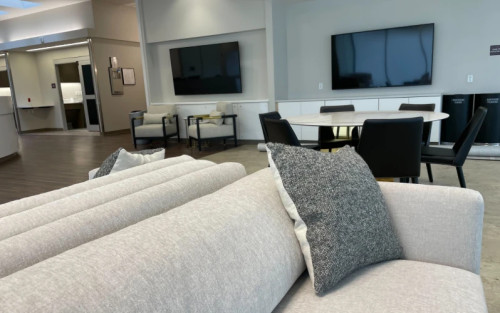






Plus by APN Denver
Verified Center
This provider's information has been quality-checked by Recovery.com's Research Team for accuracy and completeness, including center verification through appropriate third-party organizations.
Treatment Focus
This center treats mental health conditions and co-occurring substance use. You receive collaborative, individualized treatment that addresses both issues for whole-person healing.
Primary Level of Care
Outpatient treatment offers flexible therapeutic and medical care without the need to stay overnight in a hospital or inpatient facility. Some centers off intensive outpatient program (IOP), which falls between inpatient care and traditional outpatient service.
Treatment Focus
This center treats mental health conditions and co-occurring substance use. You receive collaborative, individualized treatment that addresses both issues for whole-person healing.
Primary Level of Care
Outpatient treatment offers flexible therapeutic and medical care without the need to stay overnight in a hospital or inpatient facility. Some centers off intensive outpatient program (IOP), which falls between inpatient care and traditional outpatient service.
Provider's Policy
We are able to work out of network with most PPO insurances. Coverage varies based on conditions and treatment. Click the Verify Insurance button below or call APN directly to verify benefits.
Plus by APN Denver
Plus by APN Denver
About Plus by APN Denver
Plus by All Points North (APN) Denver provides advanced outpatient treatment services for mental health conditions. APN Lodge, their residential center in Edwards, Colorado, offers continued recovery services in a residential setting. Plus by APN offers a range of services, including integrative psychiatry, deep transcranial magnetic stimulation (TMS), intensive outpatient care, ketamine treatment, the stellate ganglion block (SGB) protocol, and medication management for mental health conditions.
Integrative Care for Mental Health Conditions
Plus by APN Denver addresses multiple mental health conditions with their array of services. Conditions their services treat include depression, anxiety, trauma, post-traumatic stress disorder (PTSD), chronic stress, obsessive compulsive disorder (OCD), and more. Along with modern mental health care services, Plus by APN also offers therapy in an in-person or virtual setting, using APN Connection. All therapists are masters-level.
Medically Supervised Ketamine Treatment and Neurofeedback
Plus by APN Denver provides medically supervised ketamine treatment for depression, suicidal ideation, trauma, and more. Staff assess each client to determine if ketamine treatment is a good fit for them. They administer ketamine intravenously and intramuscularly. Plus by APN Denver additionally offers deep TMS and hyperbaric oxygen therapy to rewire the brain and restore healthy functioning.
Experience Noticeable Relief and Compassionate Treatment Guidance
Plus by APN Denver offers the stellate ganglion block (SGB) protocol, which can lower the fight or flight response down to pre-trauma levels. The protocol involves 1-2 injections of local anesthetic into the stellate ganglion, which can reduce stress or trauma. Clients typically undergo one session to see results. Plus by APN Denver’s integrative psychiatry services include medication management, support, and personalized guidance through treatment. Staff collaborate with outside providers to deeply understand each client’s history and create a plan to manage their mental health. Clients can continue their care at APN’s residential facility in Edwards, Colorado.
Highlights from the Center
Highlights
These highlights are provided by and paid for by the center.
Customized Treatment Plans
Neuro/Bio Feedback Therapy
Wellness Emphasis
Trauma-Informed Care
Center Overview
Treatment Focus
This center treats mental health conditions and co-occurring substance use. You receive collaborative, individualized treatment that addresses both issues for whole-person healing.

Insurance Accepted
Cash Pay Rates
Estimated Cash Pay Rate
Center pricing can vary based on program and length of stay. Contact the center for more information. Recovery.com strives for price transparency so you can make an informed decision.
Meet Your Care Team

Dr. Philip Hemphill
Chief Clinical Officer
PhD, LCSW

Dr. Kate Daly
Medical Director
MD, MPhil

Jeffrey Olson
Primary Therapist
LPC, LAC

Derek Wood
Registered Nurse
MS, RN, PMH - BC, WCC

Kairen Rocha
Registered Nurse
RN




Levels of Care





Your Care Options
Specializations
Post Traumatic Stress Disorder
PTSD is a long-term mental health issue caused by a disturbing event or events. Symptoms include anxiety, dissociation, flashbacks, and intrusive thoughts.
1-on-1 Counseling
Patient and therapist meet 1-on-1 to work through difficult emotions and behavioral challenges in a personal, private setting.
Anxiety
Anxiety is a common mental health condition that can include excessive worry, panic attacks, physical tension, and increased blood pressure.
Depression
Symptoms of depression may include fatigue, a sense of numbness, and loss of interest in activities. This condition can range from mild to severe.
Co-Occurring Disorders
A person with multiple mental health diagnoses, such as addiction and depression, has co-occurring disorders also called dual diagnosis.
Trauma
Some traumatic events are so disturbing that they cause long-term mental health problems. Those ongoing issues can also be referred to as "trauma."
Ketamine Therapy
Ketamine therapy uses ketamine, a dissociative anesthetic, to provide rapid relief for severe depression, trauma symptoms, and other mental health conditions.
Who We Treat
Men and Women
Men and women attend treatment for addiction in a co-ed setting, going to therapy groups together to share experiences, struggles, and successes.
Young Adults
Emerging adults ages 18-25 receive treatment catered to the unique challenges of early adulthood, like college, risky behaviors, and vocational struggles.
Midlife Adults
For adults ages 40+, treatment shifts to focus on the unique challenges, blocks, and risk factors of their age group, and unites peers in a similar community.
Approaches
Bio-Medical
A philosophy focusing on the biomechanics behind mental health disorders, using prescribed medications as a supplement to behavioral therapy.
Holistic
A non-medicinal, wellness-focused approach that aims to align the mind, body, and spirit for deep and lasting healing.
Evidence-Based
A combination of scientifically rooted therapies and treatments make up evidence-based care, defined by their measured and proven results.
Individual Treatment
Individual care meets the needs of each patient, using personalized treatment to provide them the most relevant care and greatest chance of success.
Wellness
Wellness philosophies focus on the physical, mental, and spiritual wellness of each patient, helping them restore purpose with natural remedies.
Therapies
1-on-1 Counseling
Patient and therapist meet 1-on-1 to work through difficult emotions and behavioral challenges in a personal, private setting.
Trauma-Specific Therapy
This form of talk therapy addresses any childhood trauma at the root of a patient's current diagnosis.
Transcranial Magnetic Stimulation
Localized magnetic pulses stimulate areas of the brain to increase brain activity and reduce abnormal functions.
Ketamine Therapy
Ketamine therapy uses ketamine, a dissociative anesthetic, to provide rapid relief for severe depression, trauma symptoms, and other mental health conditions.
Neurofeedback
During therapy, patients observe their own brain waves as interpreted by an EEG. This empowers them to understand and regulate emotional responses.
Conditions We Treat
Post Traumatic Stress Disorder
PTSD is a long-term mental health issue caused by a disturbing event or events. Symptoms include anxiety, dissociation, flashbacks, and intrusive thoughts.
Anxiety
Anxiety is a common mental health condition that can include excessive worry, panic attacks, physical tension, and increased blood pressure.
Depression
Symptoms of depression may include fatigue, a sense of numbness, and loss of interest in activities. This condition can range from mild to severe.
Obsessive Compulsive Disorder (OCD)
OCD is characterized by intrusive and distressing thoughts that drive repetitive behaviors. This pattern disrupts daily life and relationships.
Stress
Stress is a natural reaction to challenges, and it can even help you adapt. However, chronic stress can cause physical and mental health issues.
Trauma
Some traumatic events are so disturbing that they cause long-term mental health problems. Those ongoing issues can also be referred to as "trauma."
Substances We Treat
Co-Occurring Disorders
A person with multiple mental health diagnoses, such as addiction and depression, has co-occurring disorders also called dual diagnosis.
Drug Addiction
Drug addiction is the excessive and repetitive use of substances, despite harmful consequences to a person's life, health, and relationships.
Smoking Cessation
Quitting smoking—i.e., ceasing to smoke—means giving up smoking nicotine and tobacco products. This process has very important health benefits.
Alcohol
Using alcohol as a coping mechanism, or drinking excessively throughout the week, signals an alcohol use disorder.
Languages
Aftercare
Care Designed for Your Needs
Amenities






